Allergy News & Information Blog

Preparing for Fall Allergies: What New Orleans Residents Should Know
As fall arrives in New Orleans, cooler temperatures and colorful foliage create a welcome change from summer heat. But for many residents, the season also brings an uptick in allergy symptoms. Sneezing, congestion, and itchy eyes can make it harder to enjoy outdoor activities—or even get a good night’s rest.
While most people associate allergies with springtime, fall is another peak allergy season in Louisiana. Here’s what’s behind it and what you can do to protect your health.
Common Fall Allergy Triggers in New Orleans
🌿 Ragweed pollen – Ragweed begins pollinating in late summer and can continue into October. Its pollen is lightweight and can travel long distances, affecting residents even when ragweed isn’t growing nearby.
💦 Mold – Damp conditions in Louisiana create ideal environments for mold growth, both indoors and outdoors. Wet leaves and humid spaces can release mold spores that trigger allergy symptoms.
🦠 Dust mites – Cooler months mean more time indoors, which increases exposure to dust mites that thrive in bedding, upholstery, and carpets.
How to Manage and Reduce Fall Allergy Symptoms
✅ Get tested by an allergist
A board-certified allergist can perform testing to identify your specific triggers and create a personalized care plan that may include medications or lifestyle adjustments.
✅ Monitor pollen counts
Check local forecasts and avoid outdoor activities during times of high pollen, typically in the early morning and evening.
✅ Limit exposure to allergens
Wear sunglasses, masks, or hats outdoors to reduce pollen contact.
✅ Keep doors and windows closed
Use your HVAC system with a HEPA filter instead of open windows to limit allergens entering your home.
✅ Change clothes and shower after being outside
This helps wash away pollen that may cling to your skin and hair.
✅ Maintain a clean home environment
Vacuum and dust regularly, wash bedding in hot water weekly, and keep pets bathed and groomed. Indoor air purifiers with HEPA filters can also reduce allergen levels.
✅ Consider allergy medications
Antihistamines, decongestants, or corticosteroid nasal sprays may help manage symptoms. Always follow your provider’s recommendations when using prescription or over-the-counter medications.
✅ Discuss immunotherapy with your allergist
For persistent symptoms, allergy shots or sublingual drops may help desensitize your immune system to triggers and provide longer-term relief.
When to Seek Professional Help
While allergies are usually not dangerous, untreated symptoms can interfere with sleep, focus, and quality of life. If your symptoms are persistent or worsening despite home strategies, it may be time to see a specialist.
At ENT & Allergy of New Orleans, our team helps residents across the Greater New Orleans area manage sinus and allergy conditions. From testing and diagnosis to personalized treatment options, we’re here to support your long-term sinus and allergy health.
📍 Conveniently serving patients throughout New Orleans and surrounding parishes.Schedule a consultation today to learn more about managing your seasonal allergies.
Disclaimer:
The information provided in this article is for informational and educational purposes only and does not constitute medical advice. It is not intended to diagnose, treat, cure, or prevent any disease or medical condition. Always seek the guidance of your physician or other qualified healthcare provider with any questions you may have regarding a medical condition or treatment.
Results may vary: Treatment outcomes and health experiences may differ based on individual medical history, condition severity, and response to care.
Emergency Notice: If you are experiencing a medical emergency, call 911 or seek immediate medical attention.


